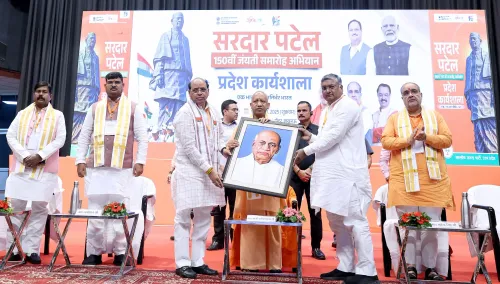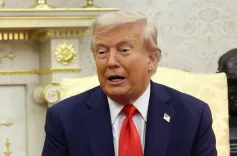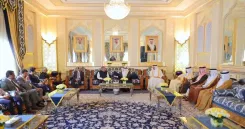Does India Take a Position on Dalai Lama's Succession?

Synopsis
Key Takeaways
- India maintains a neutral stance on religious matters.
- The Dalai Lama confirmed the existence of a 15th reincarnation.
- The Gaden Phodrang Trust holds authority over the reincarnation process.
- China insists on its involvement in the reincarnation.
- Support for the continuation of the Dalai Lama institution comes from various global followers.
New Delhi, July 4 (NationPress) In response to the recent comments from the Tibetan spiritual leader, the Dalai Lama, the Indian government declared on Friday that it does not take any position or make statements regarding matters of faith and religion.
"We have observed reports concerning the remarks made by His Holiness the Dalai Lama regarding the future of the Dalai Lama institution. The Government of India maintains that it does not take a position or engage in discussions related to beliefs and religious practices. The government has consistently upheld the freedom of religion for all individuals in India and will continue to do so," stated Randhir Jaiswal, spokesperson for the Ministry of External Affairs (MEA), while addressing media questions on the matter.
As the exiled Tibetan spiritual leader approaches his 90th birthday, he confirmed on Wednesday that there will indeed be a 15th reincarnation, marking an important declaration regarding the future of the 600-year-old institution after his passing.
Reassuring followers worldwide who are concerned about the future of their spiritual and cultural leadership, the Dalai Lama stated that his office, the Gaden Phodrang Trust, holds sole authority over the reincarnation process, despite China's insistence that it would have the final say.
Shortly after the Tibetan spiritual leader dismissed Beijing's control in selecting his successor, China asserted that the reincarnation must receive approval from the Chinese government and must take place within China.
Moreover, the supposed reincarnation must adhere to religious traditions and historical practices, as well as comply with Chinese laws and regulations.
However, Tenzin Lakshey, spokesperson for the Central Tibetan Administration (CTA) based in McLeodganj, emphasized that China has no influence in the reincarnation process of any Tibetan religious leader.
"The Chinese government is an offender of the faith," he remarked to the media.
In a highly anticipated statement at the beginning of a three-day Buddhist religious conference in McLeodganj, a picturesque hill station near Dharamsala, the Dalai Lama said, "On September 24, 2011, during a meeting with the leaders of Tibetan spiritual traditions, I made a statement to fellow Tibetans, both within and outside Tibet, as well as followers of Tibetan Buddhism regarding the institution of the Dalai Lama's continuation."
"I stated as far back as 1969 that the concerned individuals should decide the future of the Dalai Lama's reincarnations. I also indicated that when I reach the age of ninety, I will consult with high Lamas from the Tibetan Buddhist traditions, the Tibetan public, and other concerned individuals who follow Tibetan Buddhism to reassess whether the institution of the Dalai Lama should persist. Although I have not publicly discussed this issue, over the past 14 years, leaders of Tibetan spiritual traditions, members of the Tibetan parliament in exile, participants in a special general body meeting, members of the Central Tibetan Administration, NGOs, and Buddhists from the Himalayan region, Mongolia, Buddhist republics of the Russian Federation, and Buddhists across Asia, including mainland China, have reached out to me with earnest requests for the continuation of the Dalai Lama's institution," he stated.
"In particular, I have received messages through various channels from Tibetans in Tibet echoing the same plea. In light of these requests, I affirm that the institution of the Dalai Lama will continue," he concluded.
The Nobel Peace Laureate, who is celebrating his 90th birthday on July 6, clarified that the process by which a future Dalai Lama will be recognized has been explicitly defined in the September 2011 statement, which states that the responsibility for this will rest solely with the members of the Gaden Phodrang Trust.







